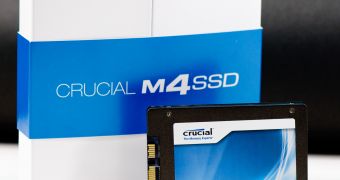Memory company Crucial, a subsidiary of Micron Technology Inc., has announced today the availability of its new “000F” version of firmware for the well-known m4 series of SSDs, on its official website.
The m4 series is the successor of the famous RealSSD C300, the first SSD to be fully SATA III capable. The RealSSD C300 was actually the first controller to make full use of the extra bandwidth SATA III was offering. With the arrival of faster NAND, the m4 raised the performance bar even further.
Crucial’s firmware releases have always brought something real for the end user. The “0009” version brought significant performance improvements, up to 20%, while the “0309” version solved the BOSD problem.
The new version firmware lists the following enhancements: improved compatibility with certain SAS expanders and peripheral RAID cards, improved throughput stability under extremely heavy workloads and better data protection in the event of unexpected, asynchronous power loss.
Editor's note:
The m4 series are very reliable and versatile as I’ve experienced myself.
During my latest holidays, I decided to buy and improve a new 17” laptop. The improvement was a doubling of its system memory from 4 GB to 8 GB, and a switch of the internal HDD with a fast SSD.
The SSD of choice was a 60 GB m4 drive that is performing quite nicely, delivering ~ 390 MB/s speeds throughout the entire capacity of the drive, no matter if the cells are empty of full with data.
This spring I thought I should repeat the experiment and buy another 17-incher, but this time the SSD of choice was a standard, quite popular, A-DATA S511 powered by a second generation SandForce SF-2281 controller.
The new drive was 120 GB in size, but the results were catastrophic: around 160 MB/s when reading cells full with data and less than 300 MB/s in free areas.
I made sure the drive was aligned. I checked whether it had the latest firmware and it did. The fact is that this was the best it could deliver.
Then I said to myself, why didn’t I buy an m4 drive? As “old” as the m4 may seem, they’re the only drives that will deliver an overall high performance with no real downsides.

 14 DAY TRIAL //
14 DAY TRIAL //